- Home
- Cory Doctorow
Eastern Standard Tribe Page 15
Eastern Standard Tribe Read online
Page 15
Doctor."
"It is. I'm giving you a mild sedative. We can't help you until you're calmerand ready to listen."
"I'm perfectly calm. I just disagree with you. I am the sort of person wholearns through debate. Medication won't stop that."
"We'll see," the doctor said, and left, before I could muster a riposte.
I was finally allowed onto the ward, dressed in what the nurses called "dayclothes" -- the civilian duds that I'd packed before leaving the hotel, which anorderly retrieved for me from a locked closet in my room. The clustered nutswere watching slackjaw TV, or staring out the windows, or rocking in place,fidgeting and muttering. I found myself a seat next to a birdy woman whose longoily hair was parted down the middle, leaving a furrow in her scalp lined withtwin rows of dandruff. She was young, maybe twenty-five, and seemed the leaststuporous of the lot.
"Hello," I said to her.
She smiled shyly, then pitched forward and vomited copiously and noisily betweenher knees. I shrank back and struggled to keep my face neutral. A nurse hastenedto her side and dropped a plastic bucket in the stream of puke, which was stillgushing out of her mouth, her thin chest heaving.
"Here, Sarah, in here," the nurse said, with an air of irritation.
"Can I help?" I said, ridiculously.
She looked sharply at me. "Art, isn't it? Why aren't you in Group? It's afterone!"
"Group?" I asked.
"Group. In that corner, there." She gestured at a collection of sagging sofasunderneath one of the ward's grilled-in windows. "You're late, and they'vestarted without you."
There were four other people there, two women and a young boy, and a doctor inmufti, identifiable by his shoes -- not slippers -- and his staff of office, thealmighty badge-on-a-lanyard.
Throbbing with dread, I moved away from the still-heaving girl to the sofacluster and stood at its edge. The group turned to look at me. The doctorcleared his throat. "Group, this is Art. Glad you made it, Art. You're a littlelate, but we're just getting started here, so that's OK. This is Lucy, Fatima,and Manuel. Why don't you have a seat?" His voice was professionally smooth andstultifying.
I sank into a bright orange sofa that exhaled a cloud of dust motes that dancedin the sun streaming through the windows. It also exhaled a breath of trappedancient farts, barf-smell, and antiseptic, the *parfum de asylum* that graduallynumbed my nose to all other scents on the ward. I folded my hands in my lap andtried to look attentive.
"All right, Art. Everyone in the group is pretty new here, so you don't have toworry about not knowing what's what. There are no right or wrong things. Theonly rules are that you can't interrupt anyone, and if you want to criticize,you have to criticize the idea, and not the person who said it. All right?"
"Sure," I said. "Sure. Let's get started."
"Well, aren't you eager?" the doctor said warmly. "OK. Manuel was just tellingus about his friends."
"They're not my friends," Manuel said angrily. "They're the reason I'm here. Ihate them."
"Go on," the doctor said.
"I already *told* you, yesterday! Tony and Musafir, they're trying to get rid ofme. I make them look bad, so they want to get rid of me."
"Why do you think you make them look bad?"
"Because I'm better than them -- I'm smarter, I dress better, I get bettergrades, I score more goals. The girls like me better. They hate me for it."
"Oh yeah, you're the cat's ass, pookie," Lucy said. She was about fifteen,voluminously fat, and her full lips twisted in an elaborate sneer as she spoke.
"Lucy," the doctor said patiently, favoring her with a patronizing smile."That's not cool, OK? Criticize the idea, not the person, and only when it'syour turn, OK?"
Lucy rolled her eyes with the eloquence of teenagedom.
"All right, Manuel, thank you. Group, do you have any positive suggestions forManuel?"
Stony silence.
"OK! Manuel, some of us are good at some things, and some of us are good atothers. Your friends don't hate you, and I'm sure that if you think about it,you'll know that you don't hate them. Didn't they come visit you last weekend?Successful people are well liked, and you're no exception. We'll come back tothis tomorrow -- why don't you spend the time until then thinking of threeexamples of how your friends showed you that they liked you, and you can tell usabout it tomorrow?"
Manuel stared out the window.
"OK! Now, Art, welcome again. Tell us why you're here."
"I'm in for observation. There's a competency hearing at the end of the week."
Linda snorted and Fatima giggled.
The doctor ignored them. "But tell us *why* you think you ended up here."
"You want the whole story?"
"Whatever parts you think are important."
"It's a Tribal thing."
"I see," the doctor said.
"It's like this," I said. "It used to be that the way you chose your friends wasby finding the most like-minded people you could out of the pool of people wholived near to you. If you were lucky, you lived near a bunch of people you couldget along with. This was a lot more likely in the olden days, back before, youknow, printing and radio and such. Chances were that you'd grow up so immersedin the local doctrine that you'd never even think to question it. If you were agenius or a psycho, you might come up with a whole new way of thinking, and ifyou could pull it off, you'd either gather up a bunch of people who liked yournew idea or you'd go somewhere else, like America, where you could set up alittle colony of people who agreed with you. Most of the time, though, peoplewho didn't get along with their neighbors just moped around until they died."
"Very interesting," the doctor said, interrupting smoothly, "but you were goingto tell us how you ended up here."
"Yeah," Lucy said, "this isn't a history lesson, it's Group. Get to the point."
"I'm getting there," I said. "It just takes some background if you're going tounderstand it. Now, once ideas could travel more freely, the chances of youfinding out about a group of people somewhere else that you might get along withincreased. Like when my dad was growing up, if you were gay and from a big city,chances were that you could figure out where other gay people hung out and goand --" I waved my hands, "be *gay*, right? But if you were from a small town,you might not even know that there was such a thing as being gay -- you mightthink it was just a perversion. But as time went by, the gay people in the bigcities started making a bigger and bigger deal out of being gay, and since allthe information that the small towns consumed came from big cities, thatinformation leaked into the small towns and more gay people moved to the bigcities, built little gay zones where gay was normal.
"So back when the New World was forming and sorting out its borders andterritories, information was flowing pretty well. You had telegraphs, you hadthe Pony Express, you had thousands of little newspapers that got carried aroundon railroads and streetcars and steamers, and it wasn't long before everyoneknew what kind of person went where, even back in Europe and Asia. Peopleimmigrated here and picked where they wanted to live based on what sort ofpeople they wanted to be with, which ideas they liked best. A lot of it wasreligious, but that was just on the surface -- underneath it all was aesthetics.You wanted to go somewhere where the girls were pretty in the way you understoodprettiness, where the food smelled like food and not garbage, where shops soldgoods you could recognize. Lots of other factors were at play, too, of course --jobs and Jim Crow laws and whatnot, but the tug of finding people like you islike gravity. Lots of things work against gravity, but gravity always wins inthe end -- in the end, everything collapses. In the end, everyone ends up withthe people that are most like them that they can find."
I was warming to my subject now, in that flow state that great athletes get intowhen they just know where to swing their bat, where to plant their foot. I knewthat I was working up a great rant.
"Fast-forward to the age of email. Slowly but surely, we begin to mediate almostall of our communication over networks. Why walk down the hallway to ask
acoworker a question, when you can just send email? You don't need to interruptthem, and you can keep going on your own projects, and if you forget the answer,you can just open the message again and look at the response. There're all kindsof ways to interact with our friends over the network: we can playhallucinogenic games, chat, send pictures, code, music, funny articles, metricfuckloads of porn... The interaction is high-quality! Sure, you gain threepounds every year you spend behind the desk instead of walking

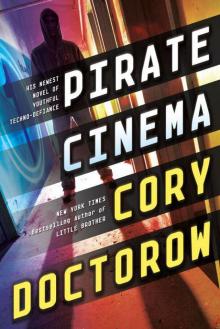 Pirate Cinema
Pirate Cinema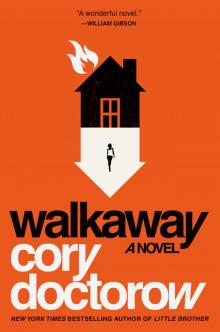 Walkaway
Walkaway Little Brother
Little Brother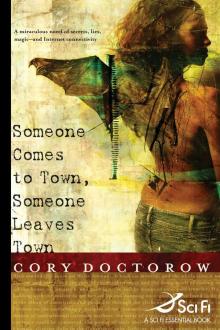 Someone Comes to Town, Someone Leaves Town
Someone Comes to Town, Someone Leaves Town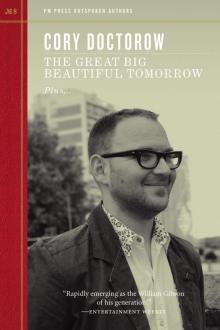 The Great Big Beautiful Tomorrow
The Great Big Beautiful Tomorrow Super Man and the Bug Out
Super Man and the Bug Out For the Win
For the Win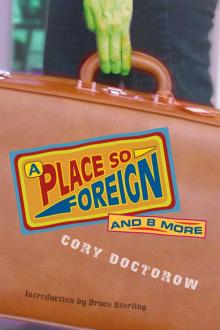 A Place so Foreign
A Place so Foreign Shadow of the Mothaship
Shadow of the Mothaship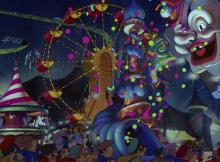 Return to Pleasure Island
Return to Pleasure Island Party Discipline
Party Discipline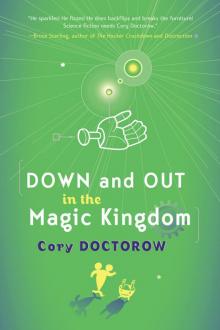 Down and Out in the Magic Kingdom
Down and Out in the Magic Kingdom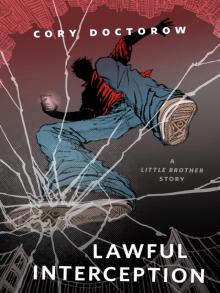 Lawful Interception
Lawful Interception Homeland
Homeland Eastern Standard Tribe
Eastern Standard Tribe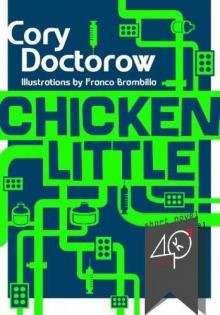 Chicken Little
Chicken Little I, Row-Boat
I, Row-Boat Makers
Makers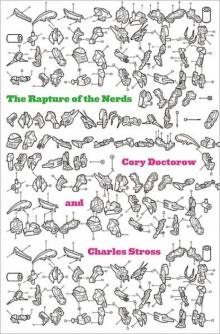 Rapture of the Nerds
Rapture of the Nerds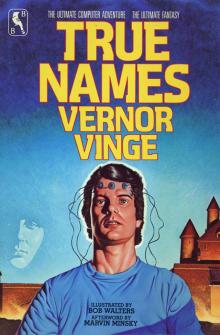 True Names
True Names